MyDigitalSSD BP4 2.5" & mSATA (240GB) Review
by Kristian Vättö on April 3, 2013 11:13 AM ESTRandom Read/Write Speed
The four corners of SSD performance are as follows: random read, random write, sequential read and sequential write speed. Random accesses are generally small in size, while sequential accesses tend to be larger and thus we have the four Iometer tests we use in all of our reviews.
Our first test writes 4KB in a completely random pattern over an 8GB space of the drive to simulate the sort of random access that you'd see on an OS drive (even this is more stressful than a normal desktop user would see). I perform three concurrent IOs and run the test for 3 minutes. The results reported are in average MB/s over the entire time. We use both standard pseudo randomly generated data for each write as well as fully random data to show you both the maximum and minimum performance offered by SandForce based drives in these tests. The average performance of SF drives will likely be somewhere in between the two values for each drive you see in the graphs. For an understanding of why this matters, read our original SandForce article.
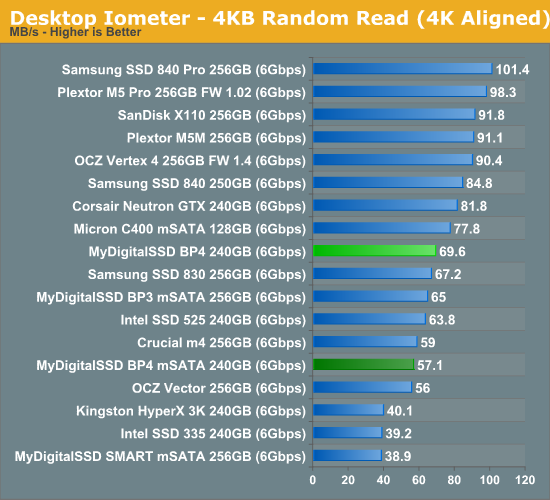
Random read performance has not been dramatically improved. In fact, the mSATA version actually takes a small hit (~12%).
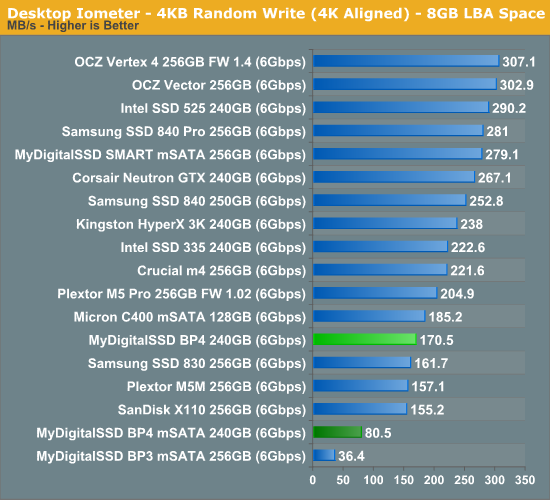
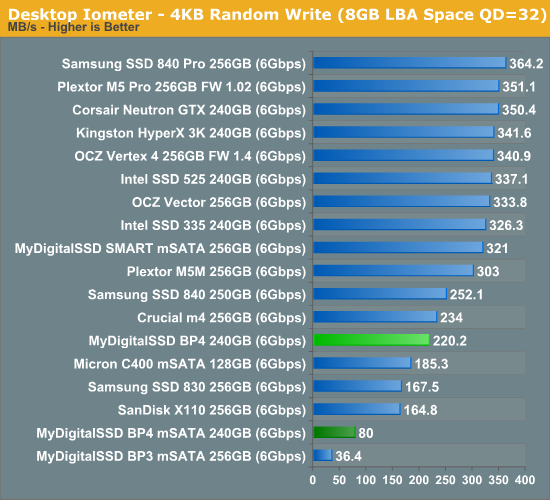
Random write speed, on the other hand, is substantially better. We are still nowhere near SandForce or OCZ Vector numbers but at least the performance is no longer sub-par. The performance also finally scales up as the queue depth increases (at least for the 2.5" model). The scaling could be more aggressive at higher QDs but I'll rather take good low QD performance as that will have a bigger impact in real world performance where most IOs are between QDs of 1 and 5.
Sequential Read/Write Speed
To measure sequential performance I ran a 1 minute long 128KB sequential test over the entire span of the drive at a queue depth of 1. The results reported are in average MB/s over the entire test length.
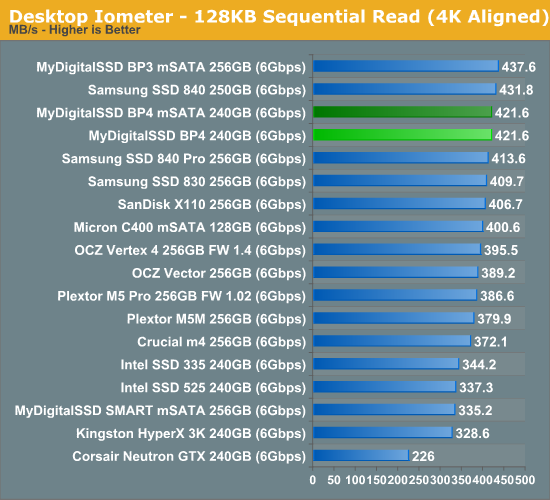
Sequential performance is also very good. Surprisingly the BP4 mSATA is again slower in write performance than the BP3 and compared to the 2.5" BP4, there is quite a big difference.
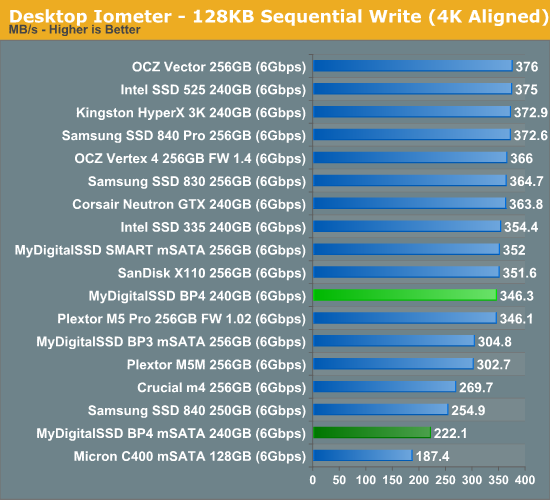
AS-SSD Incompressible Sequential Performance
The AS-SSD sequential benchmark uses incompressible data for all of its transfers. The result is a pretty big reduction in sequential write speed on SandForce based controllers.
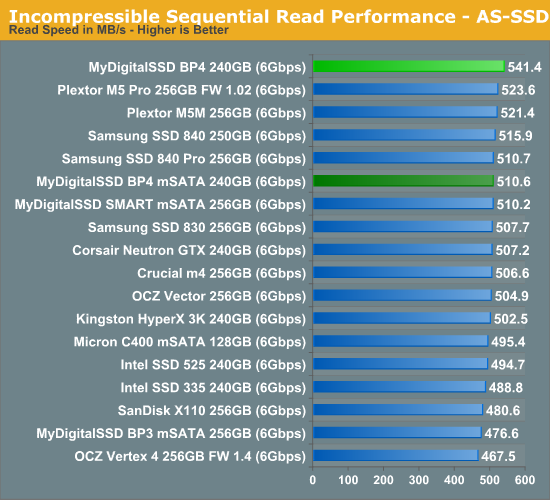
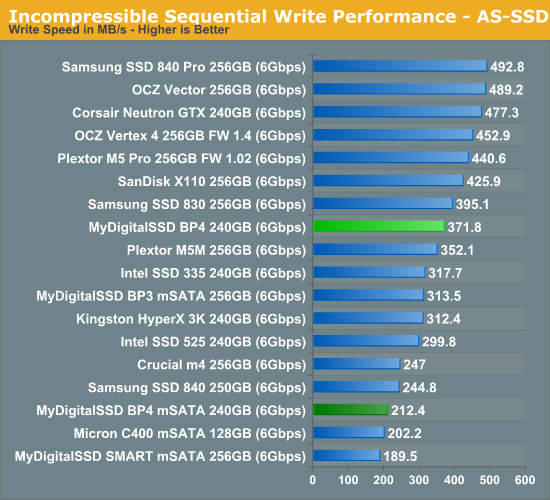










35 Comments
View All Comments
CoryS - Wednesday, April 3, 2013 - link
Everyday I check for the HTC One review, and frown :(epoon2 - Wednesday, April 3, 2013 - link
supply chain issue lolMadMan007 - Wednesday, April 3, 2013 - link
Anandtech seems to have one though, they've included it in recent Android graphics benchmark charts.thesavvymage - Wednesday, April 3, 2013 - link
they have one for sure, anand posted his thoughts on it. In that article theyve said that they are working on their reviewalexvoda - Thursday, April 4, 2013 - link
Unfortunately I lost all my interest in the HTC One ofter this:http://www.ifixit.com/Teardown/HTC+One+Teardown/13...
I find such construction method inexcusable.
SSDuser101 - Wednesday, April 3, 2013 - link
I can attest to the quality and support. I have a original BP3 from 2011 and see no reason to upgrade or change. These drives are BulletProof as the name suggests. Also followed lots of posts on Notebookreview about the drives and whenever there was a problem they fixed it. For example there was a bug with the W500 and EP121 that was pointed out and it was fixed within 4 weeks. Also they had a problem with the FW of the BP3 in early 2012 that only effected the 64GB mSATA SSD and that got fixed as well. And as far as drives dieing in the filed you will be hard pressed to find anyone who has had one brick on them. 2 thumbs up for MyDigitalSSD.Samus - Wednesday, April 3, 2013 - link
I've had a mSATA BP3 in my Elitebook Folio 9470 for about a year. Haven't had any problems...sometimes a simple controller design is better. Sandforce is ridiculously complex with a lot of things that can go wrong. With the exception of the Intel SSD 330, every Sandforce drive I've ever owned has given me problems.Johny12 - Thursday, April 4, 2013 - link
Samus, I too have had problems with my SF based SSDs earlier. But since I have started using Intel 5xx series of SSDs, my opinion about SF has changed ridiculously. I think only the first generation of their SSDs had some compatibility issues across SSD manufacturers. I am excited to hear about their yet to be launched 3rd gen controllers :DMyDigitalSSD - Wednesday, April 3, 2013 - link
Hi all Matt from MyDigitalSSD here. Thanks you for the great review. I would like to let everyone know there is a large shortage of flash in the market right now and it may be 2-3 weeks until inventory on this items is flowing again. So whatever you find on the market right now is it for about 2-3 weeks. Not the best timing for such a thing but just wanted to give a heads up for those of you wondering why you cannot find stock readily available.jhoff80 - Wednesday, April 3, 2013 - link
So, would you say that mSATA drives are generally proportional to their 2.5" counterparts? It sounds like they use the same controller, and the same flash chips (albeit fewer).For example, looking at 4KB random writes, the Intel 525 is third in performance. Would that also presumably mean that the mSATA variety of the Intel 525 would be one of the top mSATA performers?
My guess is that no, you can't assume that, but with so few sites with extensive mSATA benchmarks (and even here, there's only a couple that have been tested) it's hard to determine which is best and it'd be nice to have some way to figure it out other than guessing.